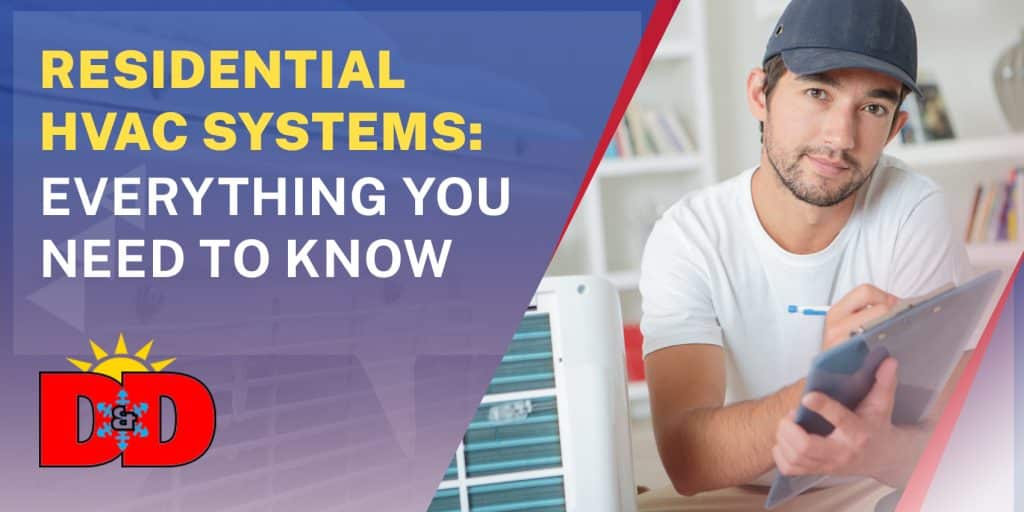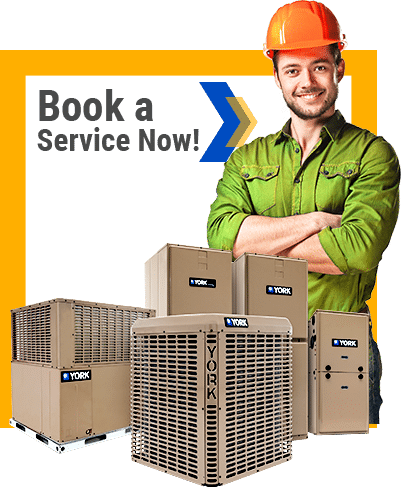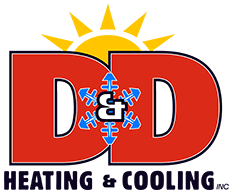Residential HVAC Systems: Everything You Need to Know

We often take our HVAC systems for granted and we expect them to work around the clock without any issues. However, that’s a pretty tall order considering how many different parts it takes to create an efficient system that provides us with comfortable climate control year-round. Our residential HVAC system has provided us with the necessary temperature regulation from the moment we wake up in the morning until we go to bed at night. But how much do you really know about your HVAC system? Well, whether you’re a new homeowner or just looking to gain a better understanding of your home’s climate control, this article is for you.
What is an HVAC system?
HVAC is actually an acronym for heating, ventilating, and air conditioning. An HVAC system is a home appliance that keeps your space at the right temperature while also regulating humidity levels to prevent mold growth and damage to any furnishings within the room.
While it’s true that many homes have central air conditioning, there are also several alternative systems that can be installed in your home. These include but are not limited to ductless mini splits, window units, and portable A/Cs.
How does an HVAC system work?
Your residential HVAC system takes the hot or cold air from outside and brings it into your home. It then uses a series of fans and coils to either heat or cool down the air before distributing it throughout your space.
One of the most important things to remember about your HVAC system is that proper maintenance is key to ensuring efficient and reliable performance. Make sure to schedule regular tune-ups with a qualified technician and regularly change your air filters.
How do I know if my HVAC system is working correctly?
Not sure if your residential HVAC unit is working properly? Here are a few things you should check:
Check your thermostat.
A properly working system should feel comfortable at all times, whether it’s heating or cooling your home. If you notice that the air is too cold when set to heat or vice versa, then your system may need to be serviced.
Be sure to check the thermostat’s heat anticipator setting. The heat anticipator is a small tab on your unit that adjusts itself to account for changes in humidity levels, so make sure it hasn’t been moved or tampered with recently.
Look for leaks.
When your residential HVAC system is turned on, it’s normal for some air to escape from the unit. However, if you’re seeing a lot of air escaping, that may indicate that there is a problem with your system.
You can also test for leaks by spraying soapy water onto any suspected areas and looking for bubbles. If you find a leak, be sure to contact an HVAC professional immediately.
Check the airflow.
To check the airflow of your HVAC, turn it off and feel the vents. If they’re cold, your system is not working properly.
If there are loose or broken parts, they could be causing issues with airflow. Check all of your unit’s components for signs of wear and tear before contacting an HVAC professional for service.
Check the power source.
Lastly, before assuming that your system is malfunctioning, check to ensure it receives power. Sometimes systems can be turned off accidentally for one reason or another.
For instance, if you have a smart thermostat installed in your home, there may be times when the unit has been automatically switched over to “away mode” due to an extended period of inactivity.
If you’ve checked all of the above and your residential HVAC system is still not working correctly, then it’s time to call in a professional.
What should I do if my HVAC system breaks down?
If your system does break down, don’t panic – take steps to protect both yourself and the unit. Here are a few things you can do:
Turn off the power to your unit.
This can be done by either flipping the breaker switch or unplugging the unit from the wall. If water spills out of the unit, turn off the circuit breaker to your home as soon as possible. Do not step in any standing water and touch any electrical equipment if you are wet.
Keep it clean.
If your system is faulty, it could start a fire if you keep anything combustible near the unit. If possible, try to relocate the unit to an open area with no trees or shrubs nearby that can catch fire from flying debris.
In addition, be sure to cover any exposed water pipes with insulation or heat mats if your A/C has stopped working. Doing so will help prevent them from freezing during the winter months, leading to costly repairs.
Keep pets and children away.
Keep in mind that a faulty HVAC system also tends to emit carbon monoxide (CO). If you have pets or children in the home and they start acting strange or sickly after an A/C malfunction, this may be because of elevated levels of CO exposure. So make sure to keep them away from the unit until a professional can come and assess the situation.
Document the issue.
Whenever you experience an HVAC system failure, be sure to document it by taking pictures or videos of the unit and the surrounding area. This will help determine what went wrong and could save you money on future repairs if there is a warranty in place. This will also help professionals diagnose the issue more quickly when they arrive on-site, resulting in less downtime for your home.
Call an HVAC professional.
Do not try to fix your system yourself, especially if you are unfamiliar with the inner workings of a residential unit. This is because additional problems may only appear once you start tinkering around with it, which can lead to further damage or even injury in some cases. Call your trusted pro immediately!
How can I keep my unit in tip-top shape all year long?
No matter how expensive your residential HVAC system is, it will eventually need repair or replacement, but there are some things you can do to help extend its lifespan and keep it running in top condition:
Regular filter replacement.
Changing your air filter regularly is one of the easiest yet most effective things you can do to improve your system’s performance. Do this at least once a month, or more often if necessary in dusty areas. This will help the unit function at its best and allow maximum airflow.
Clean the coils.
If your coils are dirty, it will cause the unit to work harder and run less efficiently. You can clean them yourself using a coil brush or hire a professional to do it for you. This should be done at least twice a year.
Proper maintenance.
Of course, the best way to keep your system in top condition is by scheduling regular maintenance with a qualified technician. This usually involves a full inspection of the unit and cleaning or replacing any worn or broken parts.
Scheduling maintenance every six months is ideal, but yearly appointments are better than nothing.
Get a warranty.
Most quality residential HVAC systems come with a warranty. If your system is still under warranty when it needs repair, the manufacturer will cover the cost of those repairs.
This can save you a lot of money in the long run, so be sure to ask about warranties when you are shopping for a new system. Often, the warranty cost is included in the overall price of the unit.
Call an HVAC professional.
Do not try to fix your system yourself, especially if you are unfamiliar with the inner workings of a residential unit. This is because additional problems may only appear once you start tinkering around with it, which can lead to further damage or even injury in some cases. Call your trusted pro immediately!
Set an Appointment With Our HVAC Pros Today!
At D&D Heating & Cooling, we pride ourselves on providing quality residential HVAC systems throughout the Lehigh Valley for 50 years. We offer a wide range of products and services so that we can find the perfect unit for your home and budget. Plus, all of our technicians are NATE-certified and fully trained on the latest industry products.
SERVICES
SERVICE AREAS
Alburtis, PA
Allentown, PA
Bath, PA
Bethlehem, PA
Breinigsville, PA
Catasauqua, PA
Center Valley, PA
Coopersburg, PA
Coplay, PA
Easton, PA
Emmaus, PA
Fleetwood, PA
Fogelsville, PA
Germansville, PA
Hellertown, PA
Kutztown, PA
Macungie, PA
Mertztown, PA
Nazareth, PA
New Tripoli, PA
Northampton, PA
Orefield, PA
Pennsburg, PA
Quakertown, PA
Schnecksville, PA
Slatington, PA
Topton, PA
Trexlertown, PA
Walnutport, PA
Whitehall, PA
Zionsville, PA

Have a Question?
Let us know how we can help
- D&D Heating & Cooling
- 200 E. Penn Avenue Alburtis, PA 18011
- Phone: 610-965-0990
- Fax: 610-965-0992
- Email Us
- D&D Heating & Cooling
- 200 E. Penn Avenue Alburtis, PA 18011
- Phone: 610-965-0990
- Fax: 610-965-0992
- Email: service@ddheat-cool.com
© 2024 D&D Heating & Cooling. All Rights Reserved. | Privacy Policy


